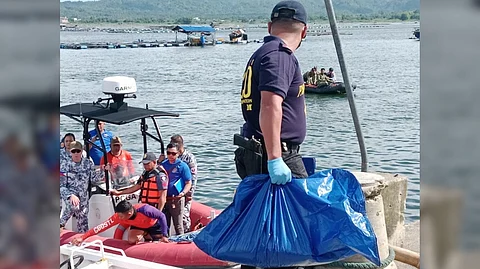
- NEWS
- the EDIT
- COMMENTARY
- BUSINESS
- LIFE
- SHOW
- ACTION
- GLOBAL GOALS
- SNAPS
- DYARYO TIRADA
- MORE

The Philippine National Police Forensic Group (PNP-FG) has received a total of 91 samples of skeletal remains recovered from the ongoing retrieval operations in Taal Lake, possibly linked to the 34 missing sabungeros (cockfighting enthusiasts).
According to Police Lt. Col. Edmar Dela Torre, chief of the PNP-FG’s DNA Laboratory Division, these 91 bone fragments were submitted for examination.
Six of the samples are believed to be human bones, with some identified as possible parts of the hip and lumbar spine.
Dela Torre added that, based on their physical characteristics, most of the skeletal remains recovered from Taal Lake are "most likely” non-human.
Dela Torre explained that the segregation process may take five to seven more days due to the condition of several samples — some are suspected to be animal remains, while others are still covered in mud.
“We will make initial findings in five to seven days, but we need to make it clear to the people that it is very challenging considering that the bones were submerged in water,” Dela Torre stressed.
He noted that the group will strictly follow the processes and protocols in identifying the samples.
“That does matter, which is why we’re pointing it out. But regardless of whether the recovery is easy or difficult, we will still subject them to examination to be transparent about what we’re doing,” he added.
Only after the separation process is completed will the confirmed human bones be subjected to DNA cross-matching to determine if they belong to any of the 34 missing individuals.
So far, the PNP Forensic Group has obtained DNA profiles from 18 relatives of the victims to aid in the identification process.
“We already have 18 samples na mag kamag-anak po for possible matching,” Dela Torre told reporters.
The disappearance of the sabungeros remains one of the country’s most mysterious and closely watched criminal cases.
Authorities hope that the forensic findings from Taal Lake may finally provide answers to the families who have long awaited justice and closure.
